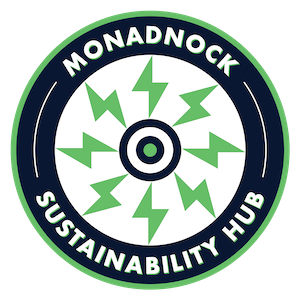By Catherine Owen Koning, Originally Published in The Monadnock Shopper News, Green Monadnock column, February 2025
March in many New England towns means town meetings. Money is needed to pay for new fire trucks, ambulance services, special education… budgets are always tight. But many towns in the Monadnock Region have found a great way to save money – by taking steps to conserve energy in their town buildings, and by adding solar panels. These actions save money and help fight climate change. However, finding the technical expertise to identify and design these improvements, and find funding, is complicated work for a small town. Who can help them?
Riding to the rescue is the Monadnock Region Energy Circuit Rider. Frank Richter is his name, and he is more than happy to help. What, you ask, is an energy circuit rider? The name originates in the practice of a clergyman or nurse, riding on horseback from town to town to provide needed services. But more recently it has referred to judges who traveled a specific route; although these judges no longer move around, the name is retained under “circuit court.”
Our energy circuit rider Frank Richter does not ride horses, but he does work for Clean Energy NH (CENH); the Monadnock Sustainability Hub also provides funding for this position. CENH has been around for 20 years so it has a lot of experience to share. They have circuit riders in the North Country, Seacoast, Sullivan County, and the Monadnock Region, assisting many of the 200-plus towns in New Hampshire. The circuit riders work with municipalities, schools, small businesses, and farms, and occasionally non-profits and other community-based groups.
“A lot of towns feel like they are on their own, it’s hard to find the resources – information, legal, town approvals, funding. We can provide a road map for renewable energy, energy, and energy efficiency,” says Frank.
The energy circuit riders help the town put together a plan. They often start with an energy audit, then connect them with qualified contractors to get multiple bids to get the best prices, help find funding, and get through the NH Saves program. The circuit riders can also help write warrant articles and request for proposals to get town approval for the project. “It is also about being able to connect towns to each other, since many towns have gone through the process and seen the immediate benefits,” Frank says.
Frank recently helped Hinsdale and Dublin get funding for solar panels through a federal grant provided to the NH Department of Energy, designed to reduce town energy use and fossil fuel emissions, improve energy efficiency, and save money for local taxpayers. “These projects will save $10,000 to $20,000 yearly in electricity costs, for the life of the project. Energy audits on the town buildings reduces heating and cooling costs. We help towns navigate EV chargers, and we help them create energy capital reserve funds in order to save for future energy-saving projects, such as solar panels or insulating the town hall,” Frank states.
Frank and the other energy circuit riders are well qualified for this kind of work. “I’ve served on town boards and commissions, I understand how they operate. We did energy efficiency retrofits on our own house, starting with insulation and weatherization and finishing up with solar on the roof and an electric car. So we know the substantial difference it has made on our budget and our comfort. This is the message I take to the towns, schools, and small businesses we assist at CENH. I’m certified by the Building Performance Institute and trained to do energy audits, so I understand how beneficial they are as a first step toward sustainability,” he says.
“My goal is to make these services available to as many towns, small businesses, and schools as possible, and to build consensus around replacing fossil fuel burning devices with clean energy-powered devices that really do save money and produce less pollution,” Frank says.
A quick endnote: Recent political changes have put the federal funding for these types of projects in jeopardy. Without this matching funding, many clean energy projects may not happen. Climate change is real and it is dangerous. So, if you are concerned, ask your senator or representative to fight to get that congressionally-approved money put back in the budget.
Catherine Owen Koning is a Professor of Environmental Science at Franklin Pierce University, where she co-coordinates the Institute for Climate Action. She is also a member of the Monadnock Sustainability Hub’s Board of Directors and co-
chairs the Keene Clean Energy Team.
